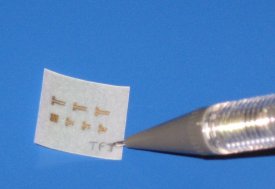Jul 22 2008
Elvira Fortunato and colleagues from the Centro de Investigação de Materiais (Cenimat/I3N), at Faculdade de Ciências e Tecnologia, Universidade Nova de Lisboa, made the first Field Effect Transistor (FET) with a paper layer. A new device which rivals in electrical performance with the actual state of the art of oxide based thin film transistors (TFTs) produced on glass or crystalline silicon substrates. These results will be published next September in IEEE Electron Device Letters.
 First paper thin film transistors
First paper thin film transistors
Nowadays, there is an increased interest in the use of biopolymers for low-cost electronic applications. Since cellulose is the Earth’s major biopolymer, some international teams have reported using paper as the physical support (substrate) of electronic devices. But, until now, no one had ever used paper as an interstrate component of a FET.
In a new approach, scientists from Cenimat/I3N – a research group coordinated by Elvira Fortunato and Rodrigo Martins – used a common sheet of paper as the dielectric layer on oxide FETs.
The research team fabricated the devices on both sides of the paper sheet. This way, the paper acts simultaneously as the electric insulator and as the substrate. «Is a two in one», says Elvira Fortunato.
Furthermore, electric characterization of devices showed that the hybrid FETs’ performance outpace those of amorphous silicon TFTs, and rival with the actual state of the art of oxide thin film transistors.
These results suggest promising new disposable electronics devices, like paper displays, smart labels, smart packaging, bio-applications, RFID tags, among others.
For more information on transistors, click here.